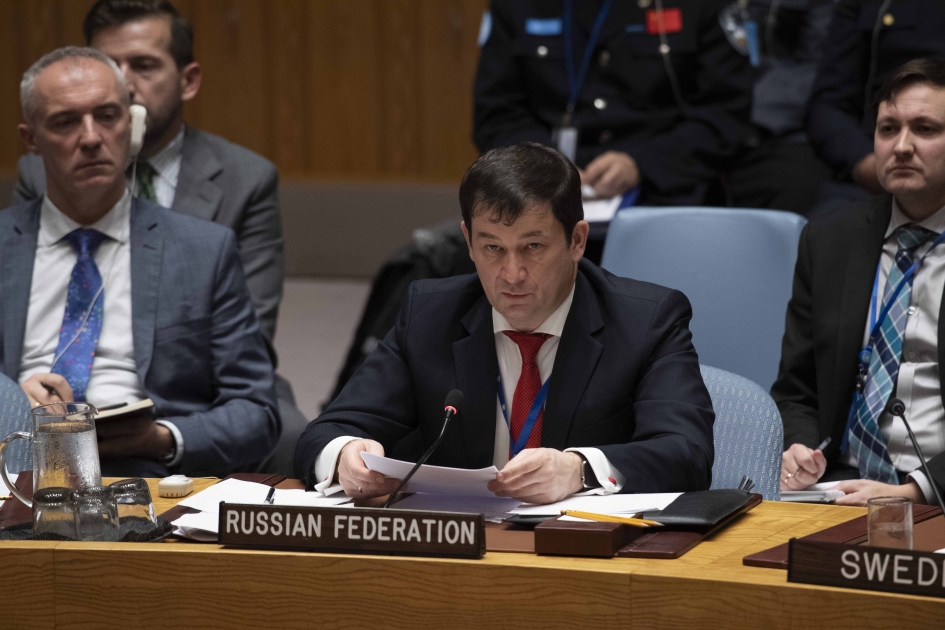Statement by Mr.Dmitry Polyanskiy, First Deputy Permanent Representative of the Russian Federation to the United Nations, at the Security Council on the UN Police Commissioners
We thank you, Mr. President, for convening today’s meeting on policing issues in United Nations peacekeeping operations and special political missions.
We are grateful to Mr. Alexander Zouev, Assistant Secretary-General for Rule of Law and Security Institutions, and the Police Commissioners of the Missions in South Sudan, the Democratic Republic of the Congo and Haiti for their thorough and useful briefings. We would also like to take this opportunity to express our thanks to all police peacekeepers for their selfless service and conscientious execution of their duties, at times in extremely difficult circumstances.
The importance of police work in United Nations peacekeeping today is clear to us all. As one of the agents of peacekeeping work, police officers carry out major tasks. They do not just help to keep public order and support national Governments’ efforts to protect civilians in the countries where they are deployed, they also play an important supporting role in reforming law-enforcement institutions and building national capacities in host States.
More and more often they have to provide assistance in addressing issues such as combating organized crime, the illegal trade in narcotics, human trafficking and other security threats. It is often the police who serve as a link between the people of host States and their Governments as well as between the people and the peacekeeping presence.
When their work is successful it can strengthen citizens’ confidence in State institutions and create conditions conducive to a return to normal life while establishing the preconditions for lasting peace and national reconciliation. In providing such assistance on behalf of the entire international community, the police, like all United Nations peacekeepers, must unswervingly fulfil the Security Council’s mandates and uphold the Charter of the United Nations and the basic principles of peacekeeping — the consent of the parties, impartiality and refraining from the use of force except in cases of self-defence and defence of the mandate. Establishing constructive and trust-based relations with the host country and taking their nationally determined priorities into account are extremely important components of effective mandate fulfilment.
It is a condition of success in this area that the principles of national ownership and respect for national sovereignty be observed. One can hardly speak of effective international support if a United Nations mission presence of many years has merely substituted the efforts of United Nations officers for those of the local police. Nor should we forget that it is local police who have the primary responsibility for ensuring the protection of civilians. The mandates of police components deployed in peacekeeping operations must be precise and realistic as well as taking into account country specifics and realities on the ground.
The aims and scope of their deployment must also be able to be adjusted rapidly based on changes that occur in their host States. In that context we encourage constant dialogue between the Security Council, troop- and police-contributing countries and host States on every aspect of the work of peacekeeping operations, including the planning and mandate-design stages.
It goes without saying that for police to do their jobs effectively the necessary material, technical and human resources should be in place. Missions must improve their planning and management, increase their efficiency in using the resources they have and avoid unnecessary expenditures and duplication of functions. Where those processes are concerned, it is important that the Secretariat carefully consider the opinions and recommendations of police-contributing countries.
As a police-contributing country, the Russian Federation has continued to expand its contribution to United Nations peacekeeping activities and to deploy officers with the relevant skills to missions. Since 1992 more than 500 employees of various bodies in Russia’s Ministry of the Interior have become police peacekeepers, and it is important to us that United Nations representatives have frequently noted their great professionalism.
We were pleased to note that following the first United Nations Chiefs of Police Summit in 2016, Russia fulfilled the commitment it had made to doubling the number of its police peacekeepers. Today Russian police officers are active in South Sudan, the Democratic Republic of the Congo, Colombia, Kosovo, Haiti and Cyprus, and 20 per cent of them are women.
The contribution of women to police work is also growing steadily in Russia itself, and in 2017, as promised, we trained a group of women officers to participate in police components of United Nations missions. Altogether, 35 women from Russia and a number of African countries participated in the course.
The Russian Interior Ministry’s United Nationscertified training centre is training police peacekeepers, including foreigners, on an ongoing and professional basis. Since 2000 it has trained more than 1,600 Russian officers and 500 foreign police peacekeepers, including commanders, from more than 50 countries.
Russia has unique experience in the area of peacekeeper vocational training that we are ready to share. We are also ready to deploy experts to participate in the work of specialized police groups in United Nations missions and to consider the issue of Russian police officers’ participation in such groups’ projects, including jointly with other countries, in anglophone missions.
